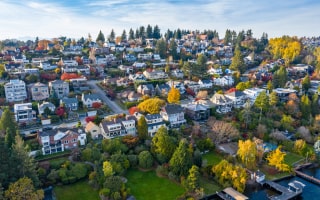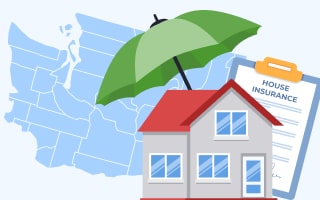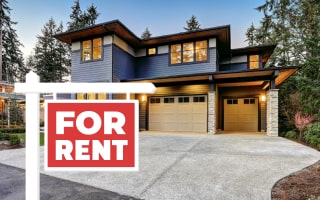Homeowners Insurance in Washington

Washington state is the home of the famous Space Needle and Mount Rainier National Park. They say it always rains in Seattle, but Washington is still a great place to live. Washington borders Canada at the top western part of the U.S., making it prone to earthquakes, wildfires, floods, hurricanes, volcano eruptions, tsunamis, and landslides. This wild variety of severe natural disasters can be devastating to property, resulting in plentiful claims and insurance losses. Since 1953, Washington has had 136 federally declared disasters (which is on the high end), and the rate of disasters per 1 million people is 17.34.
Along with damage due to natural disasters, Washington residents also file claims for fire, water damage due to faulty plumbing, other types of property damage due to vehicles, and such, theft, vandalism, and liability issues.
No state requires property owners to carry homeowners insurance or any specific limits. However, experts agree that anyone who owns property should have some type of coverage. If you take out a mortgage to buy the property in Washington state, you must purchase home insurance and keep it in force until you pay off the loan. Your lender will decide on the limits you carry.
As of October 2024, the national average for homeowners insurance is $2,728 a year, or $227 monthly. In Washington, residents pay an average of $1,400, which is still less than the national average.
Types of Homeowner Insurance Coverage Available in Washington
Every part of the country has its distinctive weather patterns and inherent perils. Depending on your location and the providers available, you can purchase specific types of homeowners insurance to cover your property. The types available in Washington are:
-
Dwelling Coverage: Dwelling coverage pays to replace or repair the structure of your home if it is destroyed or damaged by a covered peril. For example, if your house burns down, the dwelling coverage will rebuild it to its previous standards.
-
Liability Coverage: If someone gets hurt on your property (e.g., falling on icy steps) and they sue you, liability coverage will pay your legal bills.
-
Guest Medical Coverage: If someone is injured on your property, guest medical will pay their medical bills.
-
Personal Property Coverage: Personal property coverage pays to replace your personal belongings, such as furniture, clothing, electronics, etc.
-
Other Structure Coverage: Other structures coverage refers to detached buildings and items like pools, fences, sheds, garages, and hot tubs.
-
Additional Living Expenses (ALE) Coverage: If you are forced to leave the home while it is repaired or rebuilt, ALE coverage will pay for your living expenses (hotel, food, laundry, etc.).
Washington has miles of shoreline, which puts it at risk of flooding. Washington residents should also consider a flood policy and a possible umbrella policy to fill in any gaps in coverage.
FEMA (Federal Emergency Management Agency) manages the National Flood Insurance Program (NFIP) through a network of 50 providers across the U.S.
Since most homeowners insurance does not cover floods, this supplemental coverage can repair damage and replace items after a flood. Depending on the options you choose, it can cover the building and/or your personal belongings. This program is available to homeowners, renters, and businesses. Learn more about the program on FEMA's website.
Home Insurance and Natural Disasters
Global warming and climate change have caused more severe weather events than ever before. These natural disasters are raising home insurance rates by massive amounts. Over the past five years, insurance rates across the country have risen by 34% and have risen as high as 60% in some areas. Due to the frequent disasters, homeowners insurance rates have increased by 30.4% in Washington. One fire or lightning claim costs insurers an average of $77,340. One water or freezing damage claim costs $11,650, and wind and hail damage costs an average of $11,695.
Washington is subject to a wide variety of severe weather, such as earthquakes, wildfires, floods, hurricanes, volcano eruptions, tsunamis, and landslides, all of which can cause devastating property damage. 2023 was a bad year for Washington and wildfires, with 1,884 fires destroying 165,365 acres of land. From 2015 to 2019, Washington insurance providers lost $921,236,400. From 1980 to 2024, Washington had 35 billion-dollar disasters. Every year, there is an 80% chance of at least ten floods in the state of Washington. The typical cause is torrential rain during the winter months.
How Can I Save on Homeowner Insurance Premiums in Washington?
As homeowners insurance rates climb, property owners strive to find ways to save money while maintaining the coverage they need. The best way to do this is to understand what factors impact home insurance rates and make changes accordingly.
-
Location: Your location matters the most. If you live in an area with frequent natural disasters, your likelihood of filing claims is higher, and your rates will be as well. The same is true if you live in a city where crime is higher.
-
Risks: The more risks you have on your property (pools, hot tubs, treehouses, etc.), the higher your rates will be.
-
Your Deductible: The higher your deductible, the lower your rates will be. Conversely, the lower the deductible, the higher your rates.
-
Your Credit Score: People with a high credit score pay much lower premiums than those with poor credit.
-
Condition of Your Home: Houses in good condition will earn lower rates than those in disrepair.
-
Size & Age of Your Home: The size of the house matters; the more significant the home, the more it will cost to rebuild after a qualifying event. Newer homes cost far less to insure than older homes.
-
Previous Claims: If you have a history of filing claims, you will pay more than someone who doesn't file claims.
-
Coverages: The more coverage you purchase, the higher your rates.
-
Financed vs. Owned: When you finance your home, your lender dictates your coverage levels. If you own it outright, you get to decide.
-
Construction Materials: Homes built with code-friendly materials like fire-retardant shingles and siding will pay less for insurance premiums.
-
Pets: Some types of pets are dangerous and will mean you pay more for your insurance rates.
Some ways to save on homeowners insurance include:
- Raise Your Deductible: Raise your deductible as high as possible to lower your premiums.
- Adjust Your Coverage: Review your coverage each year and lower your coverage limits if you need to save money on your rates.
- Improve Your Credit: Work on improving your credit and then ask your insurer to adjust your rates accordingly.
- Make Your Home Safer: Install home security to make your home safer and save on home insurance.
- Bundle Policies: Bundle all your policies together with the same provider to get lower rates.
- Ask for Discounts: Ask your insurance company for any applicable discounts.
- Avoid Risks: Don't add new risks to your home and eliminate existing ones.
- Don't File Small Claims: Don't file any small claims; wait until you really need it before using your insurance.
- Home Improvements: Improve your roof, windows, and siding to make your home more weather-resistant and get lower rates.
Home Insurance Discounts in Washington
Home insurance protects your home against covered perils like fire, windstorms, vandalism, lawsuits, and theft. After a covered event, your insurance company pays to repair or replace your house and restore it back to its previous condition. Most policies include dwelling coverage, liability, medical payments, personal property, and loss of use coverage. Each policy has its limits, though, and anything outside of those limits will not be covered.
You can quickly get a policy by contacting the company by phone or online through its website. You can also find a local agent to work with if you need more personalized service and help determining your coverage. Once you decide, you must pay the first year in advance; then, you can pay monthly through your mortgage escrow or once a year if you don't have a mortgage.
The most common discounts offered by reputable home insurance firms include:
- Early Quote Discount: Get quotes in advance and earn a discount on your insurance.
- Claims-Free Discount: Stay claims-free for as long as possible, and you should pay less than someone with claims.
- Fire-Safety Discount: Install fire safety features like sprinklers, fire extinguishers, and smoke alarms to earn a discount on your home insurance.
- Security/Smart-Home Discount: Install a security system or smart home devices that monitor for issues and earn a discount on your insurance.
- New Home Discount: New construction homes earn discounts of up to 40% off.
- Non-smoker Discount: Non-smokers pay less on home insurance than smokers due to reduced fire risk.
- Location-based Discount: Some locations earn discounts for being low-risk and safer.
- Bundling Discount: Bundle multiple policies together with the same carrier for a discount.
- Senior Discount: Most providers offer seniors a discount on their home insurance.
- Military Discount: Military members are eligible for homeowners insurance discounts.
- Veteran Discount: Vets also get discounted rates on home insurance.
- Loyalty Discount: When you stay with the same company for many years, they often discount your rates as a thank you.
- Paperless Discount: Sign up for paperless statements and receive a home insurance discount.
- Auto-Pay Discount: Most providers offer a small discount for auto payments.
Common Rates Offer by Homeowners Insurance Firms
Newly constructed homes cost far less to insure than older homes. You could save as much as 40% on your home insurance and 26% less on homes five years old or younger. In Washington, a new construction homeowner pays roughly $854, far less than those with older homes pay. Your actual rate will vary based on your age, credit score, claims history, and other factors.
Top 10 Home Insurance Firms in Washington and Average New Home Savings
| Company | % savings |
|---|---|
| Nationwide | 76% |
| State Farm | 51% |
| Chubb | N/A |
| Travelers | 63% |
| Amica Mutual Insurance | N/A |
| Allstate | 47% |
| American Family Insurance | 55% |
| USAA | 54% |
| Liberty Mutual | N/A |
| Erie Insurance | 51% |
Home Insurance and Renovations in Washington

Home upgrades can rejuvenate your living space and make you love your home again, but they can also dramatically impact your home insurance rates. Some updates increase your space or add risk, raising your rates, while others decrease risk and make your home safer, thus lowering your rates. Others may do both simultaneously, canceling out any change to your premiums.
![]() Home Renovations that Increase Rates
Home Renovations that Increase Rates
Some home renovations that increase your rates include:
- Adding a Fireplace: A fireplace adds warmth to your home and increases your fire risk and insurance premiums.
- Building a Tree House: A tree house may delight your kids, but insurance companies call these "attractive nuisances", and they increase your home insurance rates.
- A Fountain: While a fountain may brighten up your yard, it will also raise your rates because it adds risk.
![]() Home Renovations that Decrease Rates
Home Renovations that Decrease Rates
Some home renovations that decrease your rates include:
- Home Security System: Install a good security system to keep your place safe from burglars and vandals and earn a discount on your rates.
- Fire Safety: Install a sprinkler system, smoke alarms, and fire extinguishers to make your house safer, and earn a significant discount on your home insurance premiums.
- Update the Infrastructure: Updating your home's infrastructure (foundation, roof, wiring, plumbing, and HVAC systems) can strengthen your home and make it safer and more valuable. Being proactive will also lower your rates.
Typically, adding new siding strengthens your weather resistance and lowers your insurance rates, but your rates may increase if you choose luxury materials.
Standard maintenance and elective upgrades are not covered by home insurance. Insurance companies only pay to repair or replace your home after a qualifying event. If someone gets hurt on your property during the renovation or steals from you, those things are covered under your policy. Other things not covered are rodent damage, animal damage, and pest infestations.
Always discuss any renovations with your insurance agent before starting work. They can help you understand how the project will affect your rates and coverage and if any changes are necessary.
Washington Renters' Insurance

Washington renters also need homeowners insurance to protect their homes. It does not include any dwelling coverage. The property owner must cover that. Renters insurance primarily aims to protect and replace your personal property after a qualifying event. Renters can also benefit from ALE insurance if they are unexpectedly displaced. Renters' insurance policies typically include liability, medical payments, and loss of use. Each policy has limits; nothing beyond those limits (like expensive jewelry and collectibles) will be covered.
Some covered perils include:
-
Smoke
-
Fire
-
Windstorms
-
Hail
-
Theft
-
Vandalism
Some of the items that renters insurance covers are:
-
Small Appliances
-
Furniture
-
Clothing
-
Bedding
-
Bath Items
-
Electronics
-
Sporting Equipment
Renters insurance is priced according to three main factors, and they are:
-
Location: Even as a renter, your location matters. If you live in the city, you will pay more than if you live in the country. If your area has many weather events, you will pay higher rates.
-
Coverage Amount: The more coverage you buy, the higher your premiums.
-
Number of Units: The more units in your building, the lower your rates.
Washington renters pay an average of $9 a month or $112 a year, which is considerably lower than the national average of $15-$20 a month. People living in cities will pay more than those in the suburbs or rural areas due to crime.
Condo Insurance in Washington

Washington condo owners also need homeowners insurance. Condo insurance, also known as HO-6, is slightly different, though. Condo associations have master policies that protect the dwelling. After a covered disaster, that insurance will pay to replace the building and restore it to its original condition (when it was first built). However, that may not include any upgrades to flooring, appliances, kitchens, and baths made by subsequent owners. HO-6 insurance restores the condo's interior back to its most recent condition with all the updates. Condo insurance also includes liability, medical payments, personal property, loss of use, and loss assessment coverage.
Unlike renters insurance, condo insurance has dwelling coverage, but it only covers the interior, referred to as "walls-in". Plus, the liability insurance only covers people who are injured inside the condo, not outside or on common grounds.
After a fire, windstorm, theft, or other disaster, condo insurance pays to replace the following items:
- Appliances
- Flooring
- Interior Walls
- Wiring
- Plumbing
- Light Fixtures
- Cabinets
- Countertops
- Personal Belongings
Condo owners in Washington pay an average of $465 a year or $39 a month, which is much less than the national average of $625/year for $60,000 of personal property coverage, $300,000 of liability, and a $1,000 deductible.
Some ways to save on condo insurance include:
- Raise Your Deductible
- Review and Adjust Your Policy Every Year
- Improve Your Credit
- Stay Claims Free
- Shop Around for the Best Rates
- Bundle Policies
- Improve Home Security
- Install Fire Safety Devices
- Ask for Discounts
- Remain Loyal to the Same Provider
Washington Home Insurance Market
With the insurance market in freefall, Washington state is no stranger to home insurance issues. Frequent natural disasters have caused catastrophic losses. Over the past two years, insurer losses have totaled nearly $2 billion. As a result, many providers have pulled out of the state, limited coverage, or canceled high-risk customers.
Unfortunately, Washington properties are subject to earthquakes, wildfires, floods, hurricanes, volcano eruptions, tsunamis, and landslides, all of which can destroy property and cause insurmountable claims. As this trend continues in Washington, it is becoming difficult for some residents to find coverage in high-risk areas.
No federal agency handles regulating the insurance industry. Instead, each state appoints a department or agency to monitor providers and rates, investigate customer complaints, and sanction guilty firms. In Washington, that agency is the Office of the Commissioner of Insurance, located at 14th Avenue and Water Street, Olympia, WA 98504.
Homeowners Insurance Guide
- Homeowners Insurance in Washington
- Types of Homeowner Insurance Coverage Available in Washington
- Home Insurance and Natural Disasters
- How Can I Save on Homeowner Insurance Premiums in Washington?
- Home Insurance Discounts in Washington
- Home Insurance and Renovations in Washington
- Washington Renters' Insurance
- Condo Insurance in Washington
- Washington Home Insurance Market
Instant Access to Washington Property Records
- Owner(s)
- Deed Records
- Loans & Liens
- Values
- Taxes
- Building Permits
- Purchase History
- Property Details
- And More!
Homeowners Insurance Guide
- Homeowners Insurance in Washington
- Types of Homeowner Insurance Coverage Available in Washington
- Home Insurance and Natural Disasters
- How Can I Save on Homeowner Insurance Premiums in Washington?
- Home Insurance Discounts in Washington
- Home Insurance and Renovations in Washington
- Washington Renters' Insurance
- Condo Insurance in Washington
- Washington Home Insurance Market